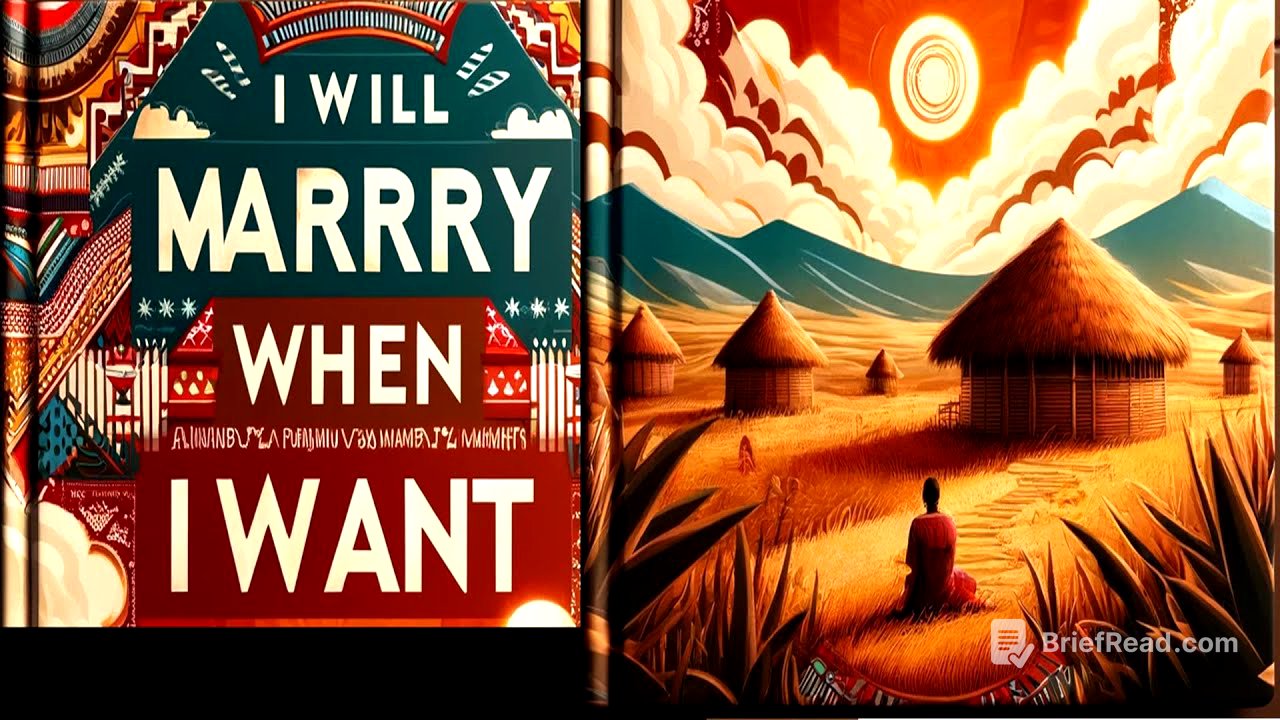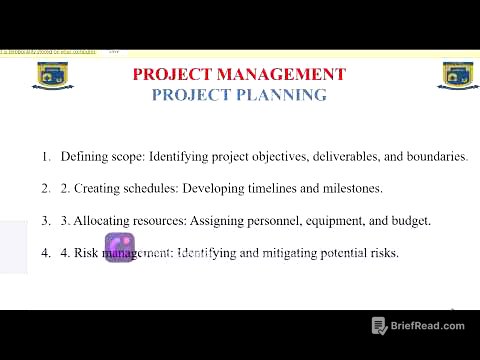TLDR;
"I Will Marry When I Want" is a play set in post-colonial Kenya that explores themes of class struggle, cultural identity, and the impact of neocolonialism. It revolves around the lives of Kunda, Wangi, and their daughter Gani, who face economic exploitation and cultural oppression. The play critiques the corrupt practices of the elite, the influence of Western ideologies, and the struggle for land ownership. Ultimately, it's a call to action, urging resistance against exploitation and a reclamation of cultural identity.
- Explores class struggle and cultural identity in post-colonial Kenya.
- Critiques the exploitation by the wealthy elite and the influence of Western ideologies.
- Highlights the importance of community resistance and reclaiming cultural identity.
Introduction [0:00]
"I Will Marry When I Want", written by Ngũgĩ wa Thiong'o and Ngũgĩ wa Mirii, is a play first performed in 1977. Set in post-colonial Kenya, the play tackles class struggle, cultural identity, exploitation, and the impact of neocolonialism on African society. The story centres on ordinary Kenyans facing economic exploitation and cultural depression after colonialism.
Setting and Characters [0:32]
The play is set in a rural Kenyan village after independence, where characters grapple with socioeconomic challenges. Kunda, a poor farmer, and his wife Wangi live in a humble home, their only possession. Their daughter, Gani, becomes central to the story. The play establishes the family's struggle to make ends meet and their pride in owning their land.
Cultural and Economic Oppression [1:07]
Kunda and Wangi represent the broader Kenyan society, where ordinary people are exploited by the wealthy elite. The play illustrates how the new Kenyan bourgeoisie, who emerged after independence, continue to exploit the working class similarly to colonial rulers. Through characters like Ahab Kĩũru and Jezebel, the play critiques the corrupt practices of the elite who maintain power by oppressing the poor.
Gani's Romantic Aspirations [1:45]
Gani, Kunda and Wangi's daughter, dreams of a better life and is romantically involved with John Muhũni, the son of a wealthy businessman. Gani hopes to escape poverty by marrying John, but her parents are wary due to the class divide. This subplot highlights love and marriage as tools for social mobility, but also as potential sources of betrayal and heartbreak.
The Influence of Religion and Western Ideologies [2:20]
Religion plays a significant role, particularly in controlling and manipulating the poor. Wealthy characters like Ahab and Jezebel use Christianity to justify their actions and pacify the masses. The play critiques how Western ideologies, including religion, have been imposed on African society, leading to the erosion of traditional values and the exploitation of the poor. The church is depicted as complicit in the oppression of the working class.
The Land and the Struggle for Ownership [3:03]
Kĩgũũnda's one-acre plot of land symbolises his identity, dignity, and connection to his ancestors. However, the wealthy seek to dispossess the poor to expand their holdings. The struggle for land ownership becomes a central theme, reflecting broader issues of land redistribution and the legacy of colonial land policies in Kenya. Kĩgũũnda's attachment to his land underscores its importance as a source of livelihood and cultural identity.
Gani's Betrayal and Disillusionment [3:44]
Gani's dreams of marrying into wealth are shattered when John Muhũni abandons her after she becomes pregnant. This exposes the deep-seated class divisions and the ruthless nature of the elite. Gani's betrayal reflects the exploitation of vulnerable individuals by those in power, and her disillusionment symbolises the broader disillusionment of the Kenyan people with the promises of independence. The play portrays the emotional and social consequences of such exploitation.
The Community's Resistance [4:21]
In response to the injustices they face, the characters begin to organise and resist exploitation by the wealthy class. The play emphasises the importance of unity and collective action among the oppressed. Kunda, Wangi, and their neighbours recognise the need for solidarity to protect their rights and land. This marks a turning point as the characters move from passive acceptance to active resistance, highlighting the power of community in the fight against oppression.
The Struggle Between Tradition and Modernity [4:58]
Throughout the play, there is tension between traditional African values and the influence of Western modernity. The characters grapple with the pressure to conform to Western norms, particularly in religion, education, and social practices. Kunda and Wangi, for instance, are pressured to have a Christian wedding to legitimise their marriage, despite their preference for traditional customs. The play critiques the alienation that results from abandoning traditional practices in favour of imposed Western ideals.
The Collapse of Kĩgũũnda's World [5:40]
As the play progresses, Kĩgũũnda's world collapses as he loses his land, dignity, and sense of identity. The play reaches its climax as Kunda and Wangi confront the harsh reality that independence has not brought the promised freedom and prosperity. Instead, it has led to a new form of exploitation where the rich thrive at the expense of the poor. This collapse symbolises the broader failure of post-colonial leadership to deliver on the promises of independence.
Conclusion [6:16]
The play ends on a somber yet resolute note, as the characters reflect on their losses and injustices. However, it also leaves the audience with a sense of hope as the characters begin to realise the importance of fighting for their rights and reclaiming their dignity. "I Will Marry When I Want" is a call to action, urging the oppressed to resist exploitation and reclaim their cultural identity and autonomy. Through its powerful narrative, the play underscores the need for continued struggle against neocolonialism and internal oppression in post-colonial Africa.









